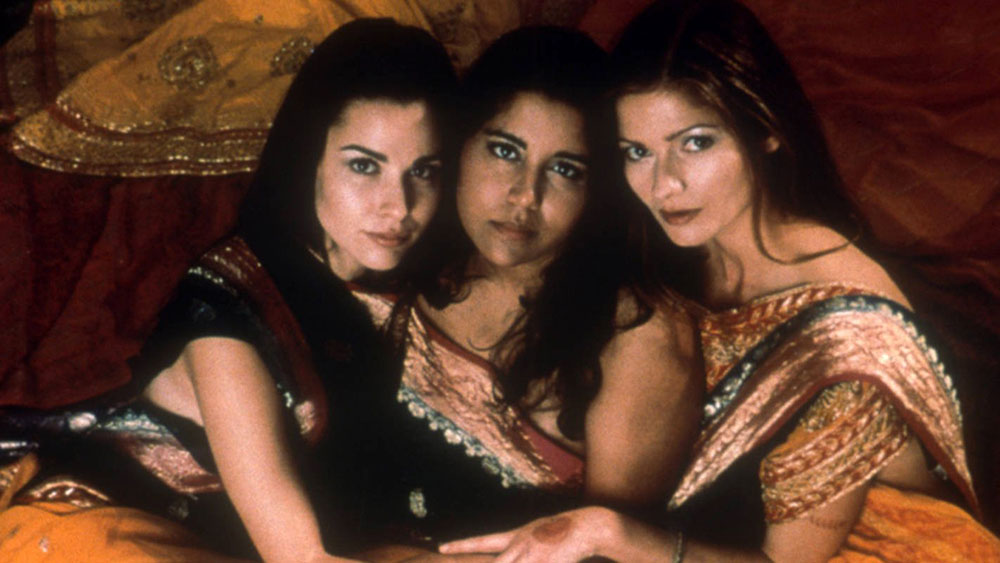Classic Film: Chutney Popcorn
Written by Ian Thomas Malone, Posted in Blog, Movie Reviews, Pop Culture
One of the defining challenges of the LGBTQ experience is the way our community exists within a broader heteronormative world, forced to juggle expectations of countless previous generations that didn’t necessarily have space for us, alongside our own desires. It’s not enough to merely survive, but to thrive in this adventure called the human experience. Life is messy enough when you’re not expected to pave your own trail.
The 1999 film Chutney Popcorn examines the essence of family through a queer lens. Reena (Nisha Ganatra, who also directed the film and co-wrote the screenplay) is a young lesbian who works at a photographer in New York City. Reena possessing the kind of strong-willed character that many write off as selfish, including her mother Meenu (Madhur Jaffrey) and sister Sarita (Sakina Jeffrey). When Sarita finds out she’s infertile, Reena offers to serve as a surrogate for her sister and brother-in-law Mitch (Nick Chundland). Reena’s pregnancy puts her at odds with her girlfriend Lisa (Jill Hennessy), and their broader childfree friend group.
Ganatra’s work has an easy, lived-in feel to it. The film never feels like it needs to explain lesbian culture to its audience, instead frequently relying on humor to ingratiate itself to its audience. Much like Reena’s reluctance to give in to her family’s expectations, Ganatra’s effort behind the camera firmly marches to the beat of its own drum. Backed by a strong minimalist score, the scenes often play out like small vignettes through a year of Reena’s life.
The film’s greatest triumph is the way Ganatra breaks down seemingly impassable messiness, making an impassioned case for the power of love to persist under the harshest circumstances. The idea of being in love with someone who wants diametrically opposite things out of life than you do is unbelievably scary. It’s not inherently a bad thing to be scared either, forcing yourself to grapple with the reality that someone you’re intrinsically wrapped up with wants something that you don’t want. That is life. Love is supposed to take you outside of yourself, to push the boundaries of the soul past the confines of your own safe harbor.
Chutney Popcorn makes no apologies for desire. People are allowed to want things. People are allowed to change their minds. People are allowed to be terrified. Human existence is defined by those moments where your back is against the wall, and the only way forward is to hold your head up high and face that which exists outside of your control with grace and dignity. You can find out a lot about the purpose of this whole experiment when you take a deep breathe and allow some space for something beyond your own orbit to gain a foothold in your world.
The film does lose a bit of steam in its third act, Ganatra’s pacing circling the runway for a bit too long at the end. The results are in service to realities that we all need reminding of every now and again. The people we love are capable of surprising us, of pushing against their own limits to support our ambitions, to accept the basic entropy of intersectionality.
The queer experience can feel isolating, an added layer to basic realities that afflict many people regardless of sexuality. Many of us have to invest in found family for our own basic survival, but all family structures are fundamentally a buy-in. Those of us queer people who want families of our own are often forced to get creative with the ways we can make that happen, alongside the other people in our lives committed to figuring out how to cross the oceans of own desires. Plenty of us have made mistakes on that front. Chutney Popcorn is full of relatable themes for a general audience, a narrative that holds up remarkably well twenty-five years down the road. Anyone who’s ever been put in an unfathomable position by a loved one could learn a lot from the grace displayed in this beautiful film.












